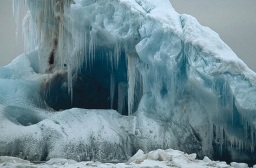 The polar universes are often and inexpressibly vague and mythological. Perhaps that’s why for such a number of years they held such heightened scrutiny for would-be explorers scraping across Earth’s final frontiers. What is strange, however, is Ruby’s account of two parallel arctic explorations three centuries apart make the arctic seem more desirous than the New World (southern edition) in the High Renaissance or industrializing America much later. Martin Frobisher and Charles Francis Hall serve the book-ends of Ruby’s narrative, who are quite expertly shown as different men first and different explorers last. Both are in searches for something, which Ruby thankfully shows us is really themselves. Frobisher, under the weight of reaching a passage to Cathay and then loading the coffers of Renaissance England with alchemic “black ore” is really a man sprawling in the turmoil of playing second fiddle. Hall, on the other hand, seeks the arctic not for wealth but for recognition, not of personal exploits, but of playing hero to a group of men already blown to dust by the arctic frost. One wonders if Hall had found Franklin’s men if he would have truly enjoyed their revelation to the modern world. Ruby makes him certainly romantic enough to try.
The polar universes are often and inexpressibly vague and mythological. Perhaps that’s why for such a number of years they held such heightened scrutiny for would-be explorers scraping across Earth’s final frontiers. What is strange, however, is Ruby’s account of two parallel arctic explorations three centuries apart make the arctic seem more desirous than the New World (southern edition) in the High Renaissance or industrializing America much later. Martin Frobisher and Charles Francis Hall serve the book-ends of Ruby’s narrative, who are quite expertly shown as different men first and different explorers last. Both are in searches for something, which Ruby thankfully shows us is really themselves. Frobisher, under the weight of reaching a passage to Cathay and then loading the coffers of Renaissance England with alchemic “black ore” is really a man sprawling in the turmoil of playing second fiddle. Hall, on the other hand, seeks the arctic not for wealth but for recognition, not of personal exploits, but of playing hero to a group of men already blown to dust by the arctic frost. One wonders if Hall had found Franklin’s men if he would have truly enjoyed their revelation to the modern world. Ruby makes him certainly romantic enough to try.

As the polar regions receive more and more attention in the upcoming years for their destruction instead of their frontier merit, books like Ruby’s are key to remembering that the arctic is more than a melting smeer on the coattails of global warming. Indeed, places like Frobisher’s Bay and Baffin Island need to be rediscovered for not only their natural beauty but human intersection. Thus, in a way, Ruby writes an environmental history that though steeping in Occidental superiorities seeks to undermine the concept that man has never truly inhabited one of the coldest places on earth. Truly, the Inuit are the heroes of this narrative, which is easy to feel as one by one they drop to death as soon as they butt up against European or American households. On a more speculative note, Ruby inadvertently, or maybe a little overtly, tells us that to each section of the earth is a set of men, and that set is limited. It’s nice at the end of the day to still believe that nature can win. Ruby makes us believe for a couple hundred of pages that this is still true.
